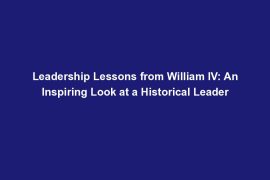Hey there, history buffs and aspiring leaders! Today, we’re diving into the fascinating world of historical leadership by taking a closer look at Oliver Cromwell.
Oliver Cromwell was a key figure in English history, known for his strong leadership during the English Civil War in the 17th century. His background as a farmer-turned-soldier and eventual Lord Protector of England showcases his unique leadership style that we can learn valuable insights from.
Studying historical leaders like Cromwell can provide us with a wealth of knowledge and inspiration for our own leadership journeys. By examining their successes and failures, we can glean important lessons that can be applied to modern-day leadership practices.
In this blog post, we’ll explore the leadership lessons that we can learn from Oliver Cromwell’s experiences. From his unwavering vision and determination to his adaptability in a constantly changing political landscape, there’s much to discover and apply to our own leadership styles.
So, buckle up and get ready to uncover the leadership gems hidden in Cromwell’s story. Let’s jump in and see what valuable lessons we can glean from this historical figure!
Leadership Lessons from Oliver Cromwell
When we think of historical leaders who have left a lasting impact on the world, Oliver Cromwell is certainly one that comes to mind. His leadership during the English Civil War and his subsequent role as Lord Protector of the Commonwealth of England, Scotland, and Ireland are still studied and debated today. So, what can we learn from Cromwell’s leadership style and experiences? Let’s delve into some key lessons that can be gleaned from his life.
Vision and Determination
One of the first things that stand out about Oliver Cromwell is his unwavering vision and determination. Leading the Parliamentarian forces to victory in the English Civil War was no easy feat, but Cromwell’s clear vision of a more just and equal society, coupled with his steely determination, helped him to overcome numerous obstacles on his path to success. Cromwell’s ability to inspire his troops and rally support around his cause serves as a powerful reminder of the importance of having a clear vision and the drive to see it through to fruition.
Adaptability and Flexibility
Another key lesson that Cromwell teaches us is the value of adaptability and flexibility in leadership. In a constantly changing political landscape, Cromwell was able to navigate the turbulent waters of 17th-century England with skill and agility. Whether it was forming alliances with other political factions or making strategic military decisions, Cromwell’s ability to adapt to new circumstances and pivot when necessary was crucial to his success. This serves as a valuable lesson for modern leaders who must navigate today’s fast-paced and ever-changing business environment.
Principled Leadership
Lastly, Oliver Cromwell’s commitment to his values and beliefs, even in the face of opposition, exemplifies the importance of principled leadership. Despite facing criticism and backlash for his decisions, Cromwell remained steadfast in his convictions and stayed true to his principles. This unwavering commitment to his beliefs not only earned him the respect of his followers but also ensured that his legacy would endure long after his death.
In conclusion, Oliver Cromwell’s leadership provides us with a wealth of lessons that can be applied to modern leadership practices. By embodying Cromwell’s vision and determination, adaptability and flexibility, and commitment to principles, modern leaders can inspire and guide their teams towards success in today’s challenging world.
Applying Cromwell’s Lessons to Modern Leadership
Now that we have delved into the leadership lessons we can learn from Oliver Cromwell’s experiences, let’s explore how these timeless principles can be applied to modern leadership in today’s dynamic and competitive business world.
Importance of having a clear vision and unwavering determination
One of the key takeaways from Cromwell’s leadership style is his unwavering determination to achieve his goals. In today’s fast-paced environment, having a clear vision of where you want to go and staying committed to that vision is essential for success. Just like Cromwell led the Parliamentarian forces to victory, modern leaders can inspire their teams by setting a clear direction and demonstrating determination in overcoming obstacles.
The value of adaptability and flexibility in navigating complex business environments
Another important lesson we can learn from Cromwell is his ability to adapt and thrive in a constantly changing political landscape. In today’s business world, being adaptable and flexible is crucial in staying ahead of the curve. Modern leaders can take a page from Cromwell’s book by embracing change, being open to new ideas, and adjusting strategies to meet the evolving needs of their industry.
The significance of upholding principles and integrity in leadership
Cromwell’s commitment to his values and beliefs, even in the face of opposition, is a powerful reminder of the importance of integrity in leadership. In today’s world where ethics and transparency are paramount, modern leaders can build trust and credibility by staying true to their principles, even when faced with challenges and criticism. By embodying honesty, fairness, and accountability, leaders can inspire loyalty and respect from their teams and stakeholders.
By applying these leadership lessons inspired by Oliver Cromwell, modern leaders can cultivate a strong foundation of vision, adaptability, and integrity to drive success in their organizations. As we navigate the complexities of the business world, let Cromwell’s timeless principles guide us in becoming effective and inspiring leaders who make a positive impact in our workplaces and communities.



